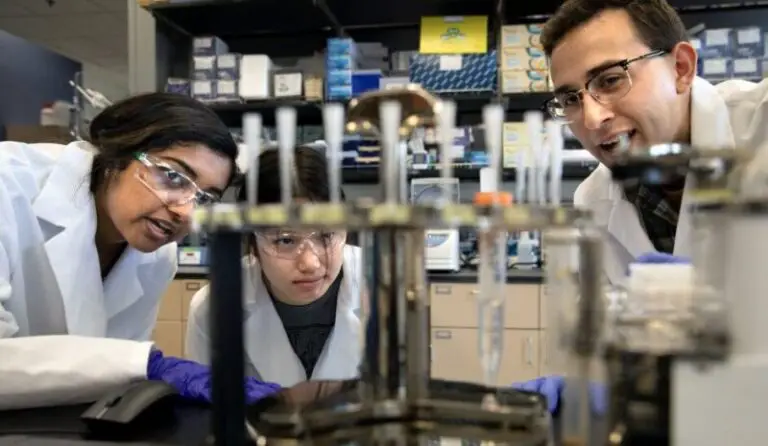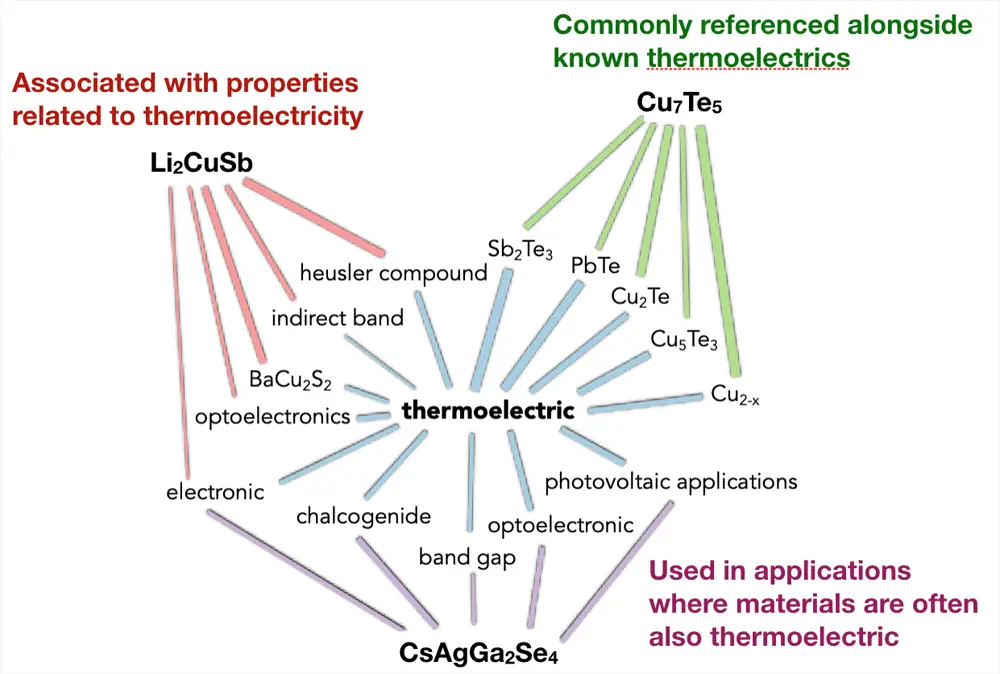AI in Scientific Research: Accelerating Discoveries

Artificial intelligence (AI) is rapidly transforming the field of scientific research, opening up new possibilities for accelerating discoveries and pushing the boundaries of human knowledge. Here are some ways in which AI is revolutionizing scientific research:

-
Data Analysis and Interpretation:

- AI algorithms can analyze vast amounts of data, identifying patterns and trends that might be missed by human researchers.
- AI-powered tools can help researchers explore complex relationships and correlations within datasets, leading to new insights and discoveries.
-
Accelerated Drug and Material Discovery:
- AI can be used to screen and design new drug molecules, reducing the time and cost of pharmaceutical research.
- AI algorithms can sift through large databases of compounds, predicting their properties and selecting those with potential therapeutic effects.
-
Automated Experimentation and Hypothesis Generation:
- AI can automate experimental setups and procedures, allowing researchers to run more experiments in a shorter time frame.
- AI algorithms can analyze experimental data, generating new hypotheses and suggesting further experiments to test them.
-
Predictive Modeling and Simulations:
- AI models can be trained on historical data to predict future events, helping researchers make informed decisions and plan experiments.
- AI simulations can be used to study complex systems, such as climate change or biological processes, and explore different scenarios without the need for physical experiments.
-
Natural Language Processing and Literature Mining:
- AI algorithms can extract information from scientific literature, helping researchers stay up-to-date with the latest findings.
- AI-powered tools can analyze large corpora of text, identifying potential research gaps and promising areas for investigation.
-
Collaboration and Knowledge Sharing:
- AI facilitates collaboration among researchers from different disciplines and institutions, breaking down barriers and fostering interdisciplinary research.
- AI enables the sharing of research data and findings in a structured and accessible manner, promoting transparency and reproducibility.
In conclusion, AI is poised to revolutionize scientific research by empowering scientists with powerful tools for data analysis, predictive modeling, and automated experimentation. As AI continues to advance, we can expect even more groundbreaking discoveries and advancements across various scientific fields.# Ai In Scientific Research: Accelerating Discoveries
Executive Summary
The rapid advancements in Artificial Intelligence (AI) are having a profound impact on diverse fields, and scientific research is not an exception. This article sheds light on the breathtaking applications of AI in scientific research and unravels the transformational role it plays in propelling scientific discoveries to unprecedented heights.
Introduction
Today’s scientific research landscape stands witness to a remarkable fusion of human intellect and computational prowess. AI’s exceptional analytical and problem-solving abilities empower researchers to decipher vast amounts of data, formulate hypotheses, and test them with unmatched precision and celerity.
Subtopic 1: AI Empowering Data Analytics
AI’s inherent capability to crunch gargantuan volumes of heterogeneous data proves instrumental in aiding researchers to uncover patterns, identify trends, and establish correlations hitherto undiscerned by human analysis alone.
-
Machine Learning’s Predictive Power: Machine learning, a branch of AI, enables researchers to build predictive models by processing historical research data. These models aid in the identification of key variables, helping predict the likelihood of different outcomes.
-
Deep Learning’s Unparalleled Accuracy: Deep Learning, another subset of AI, is achieving groundbreaking results in analyzing and interpreting complex datasets in fields like genomics and medical research. Its ability to learn from data without the need for explicit programming empowers researchers to delve into the depths of scientific data and uncover valuable insights.
-
AI’s Unbiased Perspectives: Researchers often grapple with the challenge of subjectivity while interpreting data. AI, being devoid of human biases, aids them in drawing conclusions rooted solely in empirical evidence. This objective analysis establishes a solid foundation for scientific research.
Subtopic 2: Hypothesis Formation and Testing
AI augments the traditional approach to scientific inquiry by lending a hand in formulating and testing hypotheses.
-
Automating Hypothesis Creation: With its prowess in pattern recognition, AI streamlines the generation of plausible hypotheses based on existing literature, experimental results, and research data.
-
Hypothesis Testing and Model Simulation: AI excels in the verification of hypotheses by testing them against extensive data sets and employing various models. Researchers can efficaciously test multiple hypotheses simultaneously, accelerating the scientific discovery process.
-
AI as a Virtual Collaborator: AI operates as a virtual scientific collaborator, assisting researchers in developing hypotheses and validating them by simulating experiments, saving time and resources.
Subtopic 3: AI in Drug Discovery and Medical Research
AI’s applications in medical research and drug discovery are revolutionizing the healthcare landscape.
-
Accelerated Discovery Process: AI-driven virtual screening techniques swiftly analyze libraries of potential drug compounds, filtering them down to the most promising candidates.
AI’s Contribution to Personalized Medicine: By meticulously analyzing and interpreting patient data, AI facilitates tailored treatment plans, enhancing therapeutic outcomes.
-
Drug Development with AI Assistance: AI plays a pivotal role in streamlining clinical trials by efficiently allocating patients to different treatment groups and monitoring trial progress.
Subtopic 4: AI in Environmental Research
Harnessing AI in environmental studies offers an arsenal of tools to address problems stemming from climate change and resource scarcity.
-
Climate Modeling with AI: AI-driven models contribute significantly to improving the accuracy of climate predictions and environmental impact assessment.
-
Real-Time Environmental Monitoring: Sensors and IoT devices coupled with AI deliver real-time data on parameters like air quality, pollution levels, and water health.
-
AI-Based Sustainability Solutions: AI spearheads the development of sustainable practices by analyzing vast amounts of data to optimize energy use, conserve resources, and reduce waste.
Subtopic 5: AI Advancing Materials Research
In materials research, AI empowers scientists to design and refine materials with unprecedented accuracy and precision.
-
Materials Discovery with AI: AI facilitates the exploration of vast compositional spaces, unlocking novel materials with exceptional properties.
-
Expediting Material Synthesis: AI accelerates the material synthesis process by optimizing reaction conditions and maximizing yields.
-
Material Performance Prediction: With AI at the helm, researchers can predict material behavior under diverse conditions, fostering material selection and development.
Conclusion
In scientific research, the integration of AI is akin to an alchemical fusion of human intellect and computational prowess. It strengthens our capacity to store, retrieve, analyze, and interpret scientific data, enabling us to expand our knowledge horizons. Unleashing the true potential of AI will catapult scientific research into an unprecedented golden age, fostering transformative insights that shape our understanding of the universe.
Keyword Phrase Tags
- scientific research
- artificial intelligence
- big data analytics
- machine learning
- deep learning

This article provides a fascinating insight into the potential of AI in scientific research. The examples of its use in drug discovery and materials science are particularly intriguing. I’m eager to see how this technology continues to evolve and contribute to groundbreaking discoveries.
While AI has its merits, I can’t help but feel a sense of unease about its growing role in scientific research. The idea of machines making decisions that could have profound implications for humanity fills me with unease. I believe that human judgment and oversight are still essential.
The article fails to mention the ethical considerations that arise from the use of AI in scientific research. As AI becomes more powerful, it’s crucial to establish clear guidelines and regulations to ensure responsible and ethical use. This is especially important in areas like genetic engineering and human experimentation.
The author’s claim that AI will revolutionize scientific research is exaggerated. While AI can assist in data analysis and modeling, it cannot replace the creativity and intuitive thinking that are essential for groundbreaking discoveries. Human scientists will always play a vital role in the advancement of knowledge.
It’s ironic that we’re relying on AI to accelerate scientific discoveries when the very technology we’re using is a product of scientific discoveries. It’s like a dog chasing its own tail.
Oh, AI in scientific research, the latest buzzword that will magically solve all our problems. I’m sure it will be just as successful as all the other technological advancements that have been hyped to the moon and back.
Imagine a world where AI is so advanced that scientists are just glorified lab assistants, pressing buttons and fetching coffee for their robot overlords. Maybe then we’ll have time to finally solve the age-old question: why did the chicken cross the road?
As a scientist, I’m thrilled by the potential of AI to accelerate discoveries and push the boundaries of human knowledge. However, it’s important to approach this technology with a balanced perspective, weighing both its benefits and risks. Collaboration between scientists and AI researchers is key to ensuring responsible and ethical use.
While AI has shown great promise in scientific research, I caution against overestimating its capabilities. AI is a powerful tool, but it still has limitations and biases that need to be carefully considered and addressed. Human oversight and critical thinking remain essential in ensuring the accuracy and reliability of AI-generated results.
The integration of AI into scientific research is an exciting development that holds immense potential for groundbreaking discoveries. As AI continues to evolve and become more sophisticated, I believe we’re on the cusp of a new era of scientific advancement that will reshape our understanding of the world.